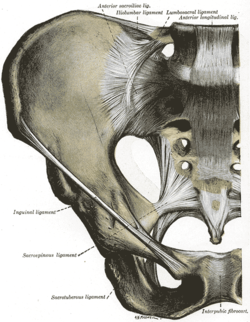Lumbosacral ligament
| Lumbosacral ligament | |
|---|---|
 Articulations of pelvis, anterior view (lumbosacral ligament labeled at center top). | |
| Details | |
| Identifiers | |
| Latin | ligamentum lumbosacrale[1] |
| Anatomical terminology | |
The lumbosacral ligament or lateral lumbosacral ligament is a ligament that helps to stabilise the lumbosacral joint. The ligament's medial attachment is at (the inferior border of) transverse process of lumbar vertebra L5; its lateral attachment is at the ala of sacrum.[2]
The lumbosacral ligament extends obliquely inferior-ward from its medial attachment. Superiorly, it is partially continuous with the inferior margin of the iliolumbar ligament[2] (the lumbosarcal ligament be considered an inferior subdivision of the iliolumbar ligament).[1]
Research
According to a cadaveric study, lumbosacral ligament forms a roof of a lumbosacral tunnel which is traversed by the (ipsilateral) lumbar spinal nerve L5; the tunnel may be the site of extraforaminal nerve entrapment due to mass effect of local pathologies.[3]
References
- ^ a b Musil V, Blankova A, Baca V (May 2018). "A plea for an extension of the anatomical nomenclature: The locomotor system". Bosnian Journal of Basic Medical Sciences. 18 (2): 117–125. doi:10.17305/bjbms.2017.2276. PMC 5988530. PMID 29144891.
- ^ a b Palastanga N, Soames R (2012). Anatomy and Human Movement: Structure and Function. Physiotherapy Essentials (6th ed.). Edinburgh: Churchill Livingstone/Elsevier. pp. 283–284. ISBN 978-0-7020-3553-1.
- ^ Transfeldt EE, Robertson D, Bradford DS (December 1993). "Ligaments of the lumbosacral spine and their role in possible extraforaminal spinal nerve entrapment and tethering". Journal of Spinal Disorders. 6 (6): 507–512. doi:10.1097/00002517-199306060-00006. PMID 8130399.
